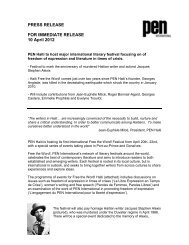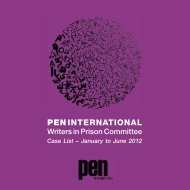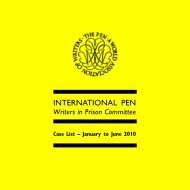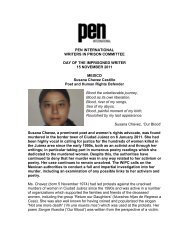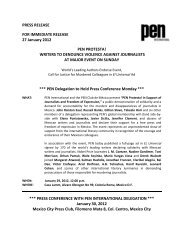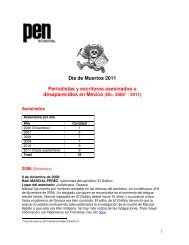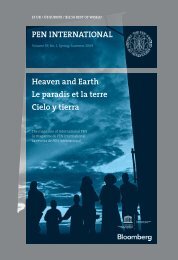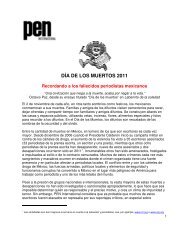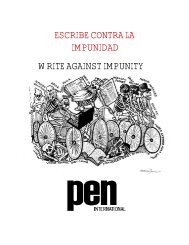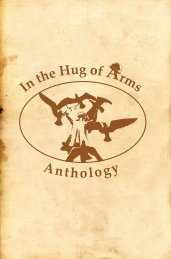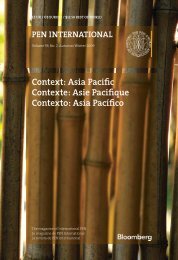July-December 2010 caselist - PEN International
July-December 2010 caselist - PEN International
July-December 2010 caselist - PEN International
- No tags were found...
Create successful ePaper yourself
Turn your PDF publications into a flip-book with our unique Google optimized e-Paper software.
vice-president of a radio station as well as a university professor andlawyer, was walking from his car to a film rental store in Valencia whenhe was approached by two men on a motorbike, one of whom shot himthree times at close range. The assailants then fled. Zambrano died atthe scene of a bullet wound to the head. He had reportedly coveredseveral drug trafficking cases in recent weeks. One story in particularwas on an influential business family in the region, the Makleds, threemembers of which were arrested in possession of 400 kilos of cocaineon 14 November 2008 and are now the subject of an investigation bythe national prosecutor’s office. The circumstances of Zambrano’s deathhave given rise to speculation that a paid assassin was responsible. Investigation:On 16 February 2009, former policeman Rafael SegundoPérez Martínez was detained in Carabobo on suspicion of havingordered Zambrano’s murder. On 21 February 2009, an arrest warrantwas issued for two men who were accused of carrying out the crime,serving policeman David Yánez Inciarte and another man, Arístides JoséCarvajal Salgado. The suspects reportedly belonged to a gang known as“Los Piloneros”, who were responsible for killing witnesses and otherswho assisted the ongoing investigation into the Makled family’s connectionto drug trafficking. Zambrano had criticised both the Makledsand the gang in his reports prior to his death. On 12 March 2009, thePublic Prosecutor’s Office asked INTERPOL to capture Walid Makled,whom the Department of Scientific, Penal and Criminal Investigationshas accused of being the mastermind behind Zambrano’s murder, alongwith Pérez. Another suspect, José Manuel Duque Daboín, was reportedlydetained on 18 <strong>July</strong> 2009. On 19 May <strong>2010</strong>, Pérez was found guilty ofconspiracy charges related to Zambrano’s murder and sentenced to 25years in prison. The court found that Pérez had monitored Zambrano’sdaily routine and provided the information to the killers. The authoritiesallege that Walid Makled planned the crime, while Yánez, Arístides,Carvajal and another member of Los Piloneros, Víctor Reales Hoyo,carried out the killing. Yánez was reportedly arrested during a police drugraid in Morón, Carabobo state, on 21 February <strong>2010</strong>; Reales and Makledremain at large. Carvajal reportedly died in a shooting involving theVenezuelan investigative police, it was reported in March <strong>2010</strong>. Update:On 19 August <strong>2010</strong> Walid Makled was arrested by Colombian authoritiesin Cucuta, Colombia, near the border with Venezuela on the basis of anarrest warrant issued against Makled in 2008 for drug trafficking. On 20August <strong>2010</strong> Venezuelan prosecutors requested the extradition of Walidon the drug trafficking charges and for planning to kill Zambrano.On trialLeocenis GARCÍA: editor of Sexto Poder magazine and journalist forthe daily newspaper Reporte Diario de la Economía, is on trial for allegedlycausing damage to property, carrying a gun without a permit andresisting arrest. He was imprisoned for more than two years, from 3 May2008 to 6 <strong>July</strong> <strong>2010</strong>. It is feared that the case may be linked to his legitimateactivities as a journalist. Details of arrest: On 3 May 2008, Garcíawas arrested along with his assistant and his driver after being accusedof causing damage to property at the offices of another newspaper, ElPeriódico, carrying a gun without a permit and resisting arrest. Accordingto his lawyer, García had gone to El Periódico’s offices in order to collectpayment for an advertisement for an airline (reportedly linked to one ofEl Periódico’s shareholders) that had been published in Sexto Poder, andto interview the vice-president of El Periódico about one of the newspaper’sowner’s alleged links to drug trafficking. Initially held at theIntelligence and Prevention Services headquarters (Dirección Generalde los Servicios de Inteligencia y Prevención, DISIP) in Valencia, Carabobo,García was transferred to Tocuyito prison in Carabobo at the endof May 2008. Concerns: García was reportedly beaten and given electricshocks while in the custody of the Carabobo police. There are fearsthat the case against him may in fact stem from his critical reporting.It is understood that over the year prior to his arrest, García had beeninvestigating alleged corruption at the state-owned petroleum companyPetróleos de Venezuela (PDVSA), and was being sued for defamationby an influential businessman who is close to PDVSA and whom Garcíahad denounced as having links to drugs trafficking. García denies everpossessing a gun and has stated that he believes his case is political andis being used to send a warning to Venezuelan journalists. His lawyer hasalleged a series of irregularities in the legal case against García, includinginconsistencies in police statements on how his arrest came about. On20 May <strong>2010</strong>, García’s detention was extended by one year, followinga request by the Public Prosecutor’s Office. His preliminary hearing hadbeen suspended more than 70 times. García began a hunger strike on 30June to call for the presiding judge to withdraw from his case. Release:On 6 <strong>July</strong> <strong>2010</strong>, the court ordered García’s release after 26 months’ detentionwithout trial. According to García’s lawyer, the release came as aresult of an injunction. The tribunal set 19 <strong>July</strong> as the date when García’spreliminary hearing was to commence, however his lawyer said he wouldpresent appeals to try to move the case to a different court. García wasreportedly transferred to a health centre on his release from prison as hehad spent seven days on hunger strike, during which time he had reportedlynot received any medical attention. No further information as of 31<strong>December</strong> <strong>2010</strong>; <strong>PEN</strong> monitoring.Attacked*Nohanna MORILLO (f), Raul GALINDO, Katherine LEDO (f) andDhamelys DÍAS: Morillo is a journalist for the newspaper El Siglo,Galindo and Ledo work for Notitarde while Díaz is a reporter for ElCarabobeño. All four, along with a TV journalist, were assaulted andinsulted on 17 October <strong>2010</strong> by supporters of the mayor of Valencia,Carabobo state, who is a member of the ruling United Socialist Party(PSUV) party. The attack took place while the journalists were reportingon a campaign to collect signatures with the aim of preventing thetransfer of some of Valencia Aquarium’s animals to South Korea. ThePSUV supporters, who were trying to stop the campaign using violence,turned on the journalists when they realized they were being filmed. Thejournalists left the scene in order to avoid further attacks.AcquittedFrancisco “Pancho” PÉREZ: columnist with the daily newspaper ElCarabobeño, was on 9 <strong>July</strong> <strong>2010</strong> found guilty of defaming the mayorof Valencia, Carabobo state, and was sentenced to three years and ninemonths in prison. The case stemmed from two columns publishedin October and November 2009 in which Pérez accused the mayor ofappointing members of his family to key positions in Valencia. Pérez wasreportedly allowed to serve his sentence at home since the jail term isshorter than five years. However, he was also banned from working injournalism for the length of the sentence, and fined 94,000 VenezuelanBolivars (US$21,000). Pérez intended to appeal the decision. Update:On 30 November <strong>2010</strong>, the sentence was overturned on appeal; the rulingis final. Perez began writing for El Carabobeño again on 6 <strong>December</strong>.39



